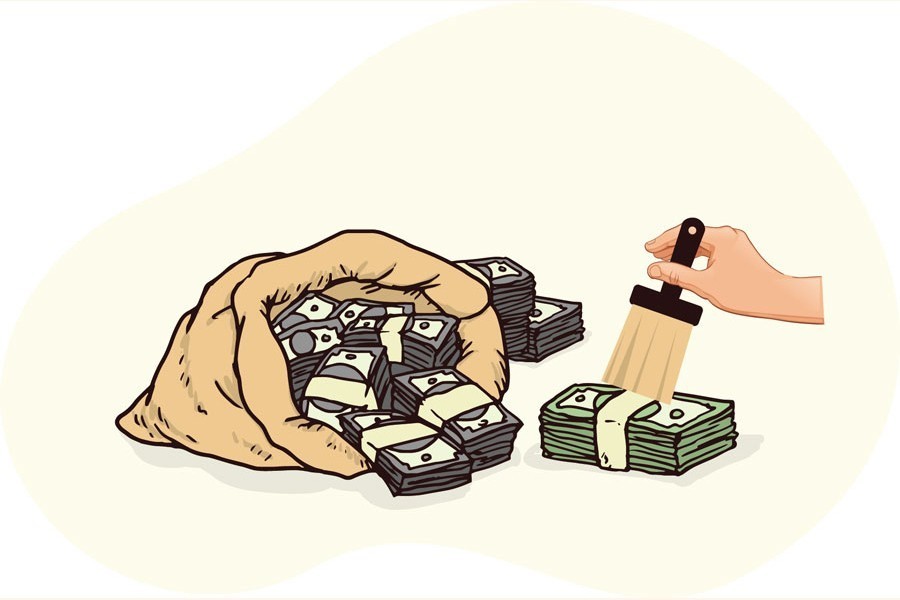
Published :
Updated :

The government has proposed no extension of the opportunity to whiten black money with 10 per cent flat rate of tax on various sectors including stock market in the next fiscal year (FY).
The Finance Bill-2021, proposed in Parliament on Thursday, has not kept the scope to extend the tenure beyond June 30, 2021.
The policy shift from giving fiscal opportunity to legalise undisclosed money or ill-gotten money for years, finally came following widespread criticism from the civil society, especially economists and businesspeople.
However, the provision of voluntary disclosure of income has been kept unchanged in the Finance Bill as, taxmen say, this is a sort of penalty with higher tax rates for the undisclosed money holders.
Under the legal provision, people will be able to disclose their money by paying 10 per cent penal tax in addition to normal tax rate.
"It (the provision) is not any injustice to the honest taxpayers because of penal tax rates in addition to normal tax rate ranging from 5.0 per cent to 25 per cent for individual taxpayers," said a senior tax official.
It is, the official explained, a penal measure, not opportunity that the tax authorities had incorporated into the Income Tax Ordinance-1984 permanently without mentioning any deadline.
According to the National Board of Revenue (NBR) data, some 10,404 people disclosed their money in the current FY until May 25, 2021 taking advantage of the blanket opportunity offered on July 1, 2020.
Until then (May 25), an amount of Tk 144.59 billion was legalised under the coverage and an amount of Tk 14.45 billion was paid as taxes to the public exchequer.
Tax officials found the response impressive this year. They reported that some Tk 145.95 billion undisclosed income was shown in the income tax returns from 2005-06 to 2019-20.
Under the coverage, people are allowed to show cash, invest in share market, debenture, real-estate and many other sectors without facing any question about source of income from the tax authorities.
Now, officials said, the NBR would launch drives to detect the people who either intentionally or reluctantly missed the year-long opportunity for legalise their income.
They insisted that such opportunity should not be offered every year in order to ensure justice to the regular taxpayers.
As it has been learnt, a section of well-off people avoids paying taxes regularly to avail such opportunity and pay tax at lower rate.
As per the budget proposal the two existing provisions - 'special tax treatment in respect of investment in securities' and 'special tax treatment in respect of undisclosed property, cash, etc' - in the Income Tax Ordinance 1984, will be scrapped.
However, the regular scheme of legalising undisclosed money through investment in economic zones and hi-tech parks and through investment in construction and purchase of building and apartment will be there.
According to Income Tax Ordinance-1984, the tax rate is 10 per cent for legalisation of untaxed money through investment in economic zones and hi-tech parks within June 2024.
The tax rates ranging between Tk 300 and Tk 5,000 for a square metre for land, building and apartment based on the location remain unchanged in the proposed budget.
Senior Research Fellow of the Centre for Policy Dialogue (CPD) Towfiqul Islam Khan hailed the discontinuation of the provision.
"Despite the fact that the widespread provisions in the last budget have raised some additional revenue, such practices discourage honest taxpayers and incenticuise tax evasion in the medium to long term," he told The Financial Express.
He said it has been possible to restrain the government from continuing these provisions with unified effort of economists, business leaders, the media and other civil society leaders.
"We must congratulate ourselves as well," he said.
In view of the pandemic, it was perhaps not possible to raise tax rates or introduce taxes in new areas in any significant manner, he pointed out.
"It is thus critical that the NBR gives its best effort to curb tax evasion, and stop illicit financial flows in order to raise incremental revenues in FY 2021-22," he added.
doulot_akter@yahoo.com


 For all latest news, follow The Financial Express Google News channel.
For all latest news, follow The Financial Express Google News channel.